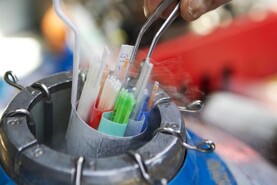Abortions: I have heard of a number of abortions this week in suckler herds. While there will always be some abortion in herds, it is important to investigate everything.
Cows should be isolated and foetuses sent to your nearest regional veterinary laboratory for a diagnosis.
Don’t put it down as a hurt, as often happens. Neosporosis is one of the top three causes of late term abortion in cows in Ireland, together with salmonellosis and leptospirosis.
Cows/heifers can abort at any stage of gestation but most abortions occur after five months.
Abortion is not generally associated with retained placenta or sickness in the cow.
A characteristic of neospora infection, however, is the much higher incidence of repeat abortions in cows exposed to the disease.
A cow infected with neospora is nine times more likely to abort than a non-infected cow.
Control of neospora-induced abortion in cattle depends on protecting feed and water from contamination by the faeces of dogs or foxes.
Doors and barriers around cattle feed should be kept closed as much as possible and dogs should not be allowed to eat aborted foetuses or placentae.
Dogs should be removed from the calving areas and should not be allowed access to foetuses and placentae.
Forage crop flowering: I was speaking to Aidan Moore in Tullamore Agri during the week and he said he has come across a number of forage crops starting to flower.
Mild weather has meant crops continued to grow and hence the heading date may be earlier.
Grazing a crop with flowers is dangerous in that it can increase the incidence of red water or kale anaemia due to a high concentration of S-methyl cysteine sulphoxide (SMCO).
Cows affected will have general weakness, loss of body condition, diarrhoea, increased heart rate and reduced appetite. Cattle should be taken off flowering crops immediately.
BEEP: Application forms for the BEEP scheme have arrived in the post this week to most suckler herdowners. Applications can be submitted online or by post.
The scheme is operating for a one-year pilot period and is worth €40 per eligible calf.
All calves being submitted for weighing must have been born between 1 July 2018 and 30 June 2019.
An unweaned live calf and their dam must be weighed on the applicant’s holding on the same day.
Only scales registered and used in accordance with the scheme can be used to weigh animals. Owned, borrowed or rented scales can be used to weigh animals.
Weights must be submitted within seven days of the actual weighing taking place. Farmers can register their scales before weighing at www.icbf.com.
Event reminder: Next week sees us kick off the first event of seven of our spring health management series mart demos in Carrigallen Mart, Co Leitrim, on Tuesday 12 February at 7pm.
The livestock team will talk about a number of topics including calf health, breeding, beef market outlook and Brexit. Finbarr Kiernan, a local vet in Cavan, is our guest speaker and all events are KT-approved.






 This is a subscriber-only article
This is a subscriber-only article










SHARING OPTIONS: